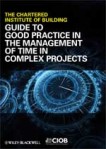Wiley and the Chartered Institute of Building have just published a new book, the Guide to Good Practice in the Management of Time in Complex Projects. The primary purpose of this Guide is to set down the standards necessary to facilitate the effective and competent management of time in complex projects. It defines the standards by which project schedules will be prepared, quality controlled, updated, reviewed and revised in practice and describes the standards of performance which should reasonably be required of a project scheduler.
 Delayed completion affects IT, process plant, oil and gas, civil engineering, shipbuilding and marine work contracts. In fact it affects all industries in all countries and the bigger the project, the more damage delayed completion causes to costs, to reputation and sometimes, even to the survival of the contracting parties themselves.
Delayed completion affects IT, process plant, oil and gas, civil engineering, shipbuilding and marine work contracts. In fact it affects all industries in all countries and the bigger the project, the more damage delayed completion causes to costs, to reputation and sometimes, even to the survival of the contracting parties themselves.
In simple projects, time can be managed intuitively by any reasonably competent person, but complex projects cannot and a more analytical approach is necessary if the project is to succeed. Although much has been written about how to apportion liability for delay after a project has gone wrong there was, until recently, no guidance on how to manage time pro-actively and effectively on complex projects.
The Guide has been developed as a scheduling reference document capable of wide application. It is a practical treatise on the processes to be followed and standards to be achieved in effective management of time. It can be used in any jurisdiction, under any form of contract, with any type of project and should be identified as the required standard for the preparation and updating of contract programmes, progress reporting and time management.
I may be biased, my partner was part of the team that developed The Guide and it recognises the importance of involving stakeholders in the development of the schedule, but I feel it has a lot to offer project planners and schedulers on any type of project.
For more information;
in Australia see: http://www.mosaicprojects.com.au/Books.html#CIOB_Guide elsewhere, http://eu.wiley.com/WileyCDA/WileyTitle/productCd-144433493X.html


[slightly tongue in cheek] I’m always amused when people claim to, or think they need to manage time: time is unmanageble, it just keeps clicking along at 60 seconds to the minute.
What we can do, tho, is manage delivery; and that’s when it gets interesting, becuase if delivery doesn’t happen, then customers become reluctant to pay!
Cute point David and recognised throughout The Guide as exampled in section 2.1.1:
An effective time management strategy will recognise that time expires at a regular and consistent rate, from inception to completion, whether it is used effectively, or at all. Accordingly, an effective planning strategy will demonstrate the most effective use of available time, in all circumstances.
It’s a useful book and can be built into contract requirements Wiley now have stocks world-wide and we can supply locally in Australia, for more information see: http://www.mosaicprojects.com.au/Book_Sales.html . The next and current challence is rolling out a certification scheme for schedulers.